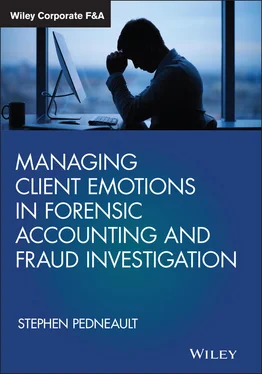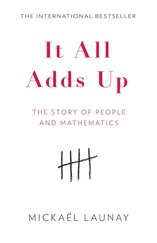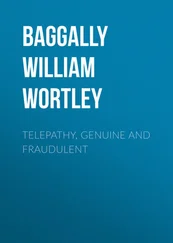And to all of the fraud professionals working in this field, and those thinking of joining it. I hope that you bring passion and professionalism to every engagement, and your career is successful and rewarding. It has been for me.
STEPHEN PEDNEAULT, CPA/CFF, CFE, is the principal of Forensic Accounting Services, LLC, a local CPA firm in Manchester, Connecticut, specializing in forensic accounting, litigation support, and fraud‐related matters.
Working in public accounting for 31 years, Steve is a certified public accountant, certified in financial forensics, and a certified fraud examiner. He has an associate's degree in criminal justice from Manchester Community College and a bachelor's degree in accounting from Eastern Connecticut State University, where he graduated summa cum laude.
Through his investigative work, Steve has examined frauds ranging from a few thousand dollars to amounts into the millions. His expertise also lies in preventing and investigating embezzlements and other financial frauds in a wide range of contexts. Steve has been disclosed in matters many times as an expert, and has testified at deposition and at trial.
As an adjunct faculty member at the University of Connecticut, Steve authored an innovative course on forensic accounting and fraud examination that has been offered since 2008 as an online class within UConn's Master of Science in Accounting (MSA) program.
When Steve is not playing detective and finding missing money, he enjoys spending time with his family, especially biking and hiking. In addition, Steve has volunteered as an EMT on a community ambulance service for over 25 years. He also contributes his time in support of Boy Scout Troop 25 of Manchester, Connecticut, where both of his boys earned the rank of Eagle Scout.
Steve has authored four other books published by Wiley: Fraud 101 ; Anatomy of a Fraud Investigation ; A Practical Guide to Preventing and Detecting Employee Theft and Embezzlement ; and Forensic Accounting and Fraud Investigation for Non‐Experts (co‐authored with Frank Rudewicz).
THIS BOOK AIMS TO educate readers about the wide range of emotions encountered in nearly every fraud engagement, while also providing tips and strategies for dealing with those emotions. My goal is to share examples of cases I've been involved in throughout my 30‐plus years in the industry and illustrate how client emotions come into play.
I am not a psychologist or social worker, nor do I profess to have expertise in these areas. I am simply an experienced CPA specializing in forensic accounting and fraud‐related matters who is willing to share what I have learned over many years.
Since there are many different contexts for fraud and financial crime, there are also many different job descriptions and titles for those who provide services in these areas. Professionals working in these fields can include fraud examiners, forensic accountants, public accountants, auditors, internal auditors, financial investigators, police officers, agents, and other investigators, as well as attorneys, prosecutors, and defense counsel. In order to use one consistent term in my discussions, I refer to the individual working in this field as a fraud examiner .
I have also used generic terminology to refer to the other actors in a fraud investigation. Individuals encountered during fraud engagements include not only victims but also suspects, witnesses, family members, spouses, friends, and business associates. Throughout my book, I often refer to “client” emotions, but the term client is meant to encompass anyone involved in the engagement, not just the individual or organization for whom the fraud examiner performs fraud‐related services.
Finally, a fraud investigation can be referred to by many names: a fraud examination, a fraud case, a fraud matter, or a fraud engagement. While the terminology may differ, each name refers to the same basic concept – a type of fraud scenario that requires the services of a fraud examiner. In my book, I use the terms case , matter , and engagement interchangeably.
Regardless of the terminology and context, fraud examiners serve the same basic but important purpose of determining the facts of a matter – the who , what , where , when , how , how long , how much , and other factual details. Today, a significant number of resources are available to teach both new and experienced fraud examiners how to perform fraud engagements, conduct interviews, collect and maintain evidence, write reports, testify at deposition and trial, and everything in between. However, a fraud examiner would be hard‐pressed to locate any resources that train them on how to address client emotions during fraud examinations.
In my experience, in nearly every fraud matter the fraud examiner will encounter a wide range of client emotions, from rage to denial to depression. Dealing with client emotions can be challenging at times, and conducting fraud engagements without addressing the emotions of the different parties involved hampers progress. Choosing to embrace rather than ignore clients’ emotions can often make the difference between successfully resolving a matter or allowing it to continue in perpetuity.
Every fraud examiner should seek out training in this area and develop practical strategies he or she can use for dealing with client emotions. There is a pressing need to discuss this aspect of fraud investigation and forensic accounting with individuals entering the field, as well as those with minimal experience. Even experienced individuals will benefit from witnessing how the success of an engagement often hinges on how fraud examiners address client emotions.
The discussions in the following chapters are based on my 31 years of experience working as a certified public accountant (CPA), specializing as a certified fraud examiner (CFE) conducting fraud investigations and forensic accounting engagements. Working in the context of public accounting, I have mainly been brought into client situations from the outside, rather than working internally within an organization or for a governmental agency. Thus, while many of the discussions apply to any context, fraud examiners may have to adapt them to their particular context.
I truly hope you can learn a thing or two from my experiences and apply this knowledge in your fraud examinations.
And to those experienced fraud examiners, I trust you will be nodding along as you read my stories, as you too have had many similar experiences in your own client matters.
Enjoy the read.
PART ONE Why Address Client Emotions?
CHAPTER 1 Encountering Client Emotions
EVERY CLIENT HAS A STORY
Every fraud engagement starts with a story. It is critical that the fraud examiner obtain this story, knowing there are at least three versions to be had: the version provided by the party retaining the fraud examiner; the version provided by opposing parties, such as the individual suspected of committing fraud; and the truth. As more parties are added to the matter, the number of versions increases, but in the end there is only one version that matters: the truth.
In order to start off my discussions about client emotions, I will start with a story. Sadly, I have seen many similar stories, and this one is a great example of how client emotions become intertwined with a fraud examination.
I received a phone call from an attorney who was calling about a potential fraud matter. After briefly introducing himself, the attorney explained that he represented a sister and brother regarding an estate matter. His clients’ mother had died a year earlier, and as part of the mother's estate planning, her assets had been designated to go directly into a trust. The brother and sister were the sole beneficiaries of the trust, sharing an equal inheritance. However, the attorney had found it difficult to obtain any information from the trustee, and his clients believed the trustee had mishandled their mother's estate and trust. Although funds were available for distribution to the attorney's clients, to date they had received nothing from the estate or trust.
Читать дальше












